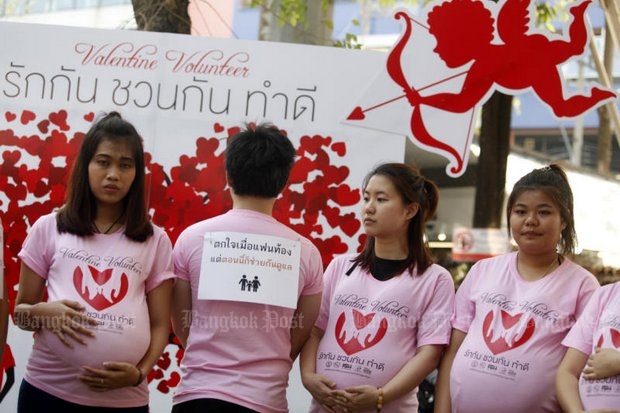As couples prepared to show their love on what's supposed to be the most amorous day of the year, City Hall says it will dish out about 7 million condoms to members of the public.
The condoms are targeted in particular for teenagers, to raise awareness of the importance of protecting against sexually transmitted diseases including HIV and unwanted pregnancies.
Many Thai male teenagers ask their partners for sex on Valentine's Day, youngsters admit.
Speaking during a volunteer campaign Monday ahead of mark Valentine's Day, a 20-year-old woman, who asked to be named only as Nan, said her ex-boyfriends mostly wanted her to have sex for the first time on the day of romance, insisting it was a way for her to prove her love.
However, Ms Nan, a university student, declined, arguing it was not the right time to have sex as she was still studying.
If she fell pregnant, it would be hard to pursue her studies and her future could be ruined, she said, adding several of her friends had dropped out of school to raise children.
During the campaign, attended by over 100 teenagers, Ms Nan posed as a pregnant woman wearing a fake pregnancy belly to encourage teenagers to use contraception or refrain from having sex.
Pornnuch Sathapolsawat, manager of a project on adolescent pregnancy, said sex is popular among teens.
An effective solution to premature pregnancy was to devise measures to help teenagers gain access to contraception.
"Only a few Thai teenagers have easy access to information on birth control. This can result in premature pregnancy which can set back their future," she said.
According to the Health Department, 4.3% of teens aged between 15 and 19 gave birth in 2015, down from 4.7% in 2014.
However, the fall in delivery rates did not mean a reduction in teenage pregnancies, just that abortion was common, she said.
Besides contraception, Ms Pornnuch said the Prevention and Solution of the Adolescent Pregnancy Act, can also help prevent pregnancy among teenagers.
Teens can also seek help via a hot line, 1663, or visit www.lovecarestation.com.
Meanwhile, Bangkok deputy governor Taweesak Lertprapan announced the free condom distribution plan, adding that condoms will be distributed to people through various channels from Tuesday to mark Valentine's Day.
Those interested in picking up free condoms from the Bangkok Metropolitan Administration (BMA) are encouraged to go to the BMA's 68 health service centres across the capital, said Mr Taweesak.
Condoms will also be made available at 438 schools and 9 hospitals under the BMA's jurisdiction, he said, adding that free tests for HIV and other sexually transmitted diseases will also being provided.
"It's estimated that in 2017 there will be more than 77,000 HIV-infected people [in Thailand], but only about 50,000 of them will be aware of their infections. This means about 22,000 won't realise they have the virus and will possibly infect others," he said.
Thiyaporn Kantathanawat of King Mongkut's Institute of Technology said an in-depth study showed that the country's past efforts to improve the situation of both sexually transmitted diseases and unwanted pregnancies among the young population have failed due to the fact that all those efforts were top-down approaches that failed to engage the target population properly.
Regarding sex education, for instance, students were taught more about the difference between the bodies of males and females rather than how to actually protect themselves from contracting sexually transmitted diseases or unwanted pregnancy by using a condom correctly, said Asst Prof Thayaporn.
Skills in abstaining from casual sex that could lead to unprotected sex along with being able to negotiate with a partner to ensure safe sex have rarely been taught to youngsters, she added, but are important to ensuring they understand the risks.

